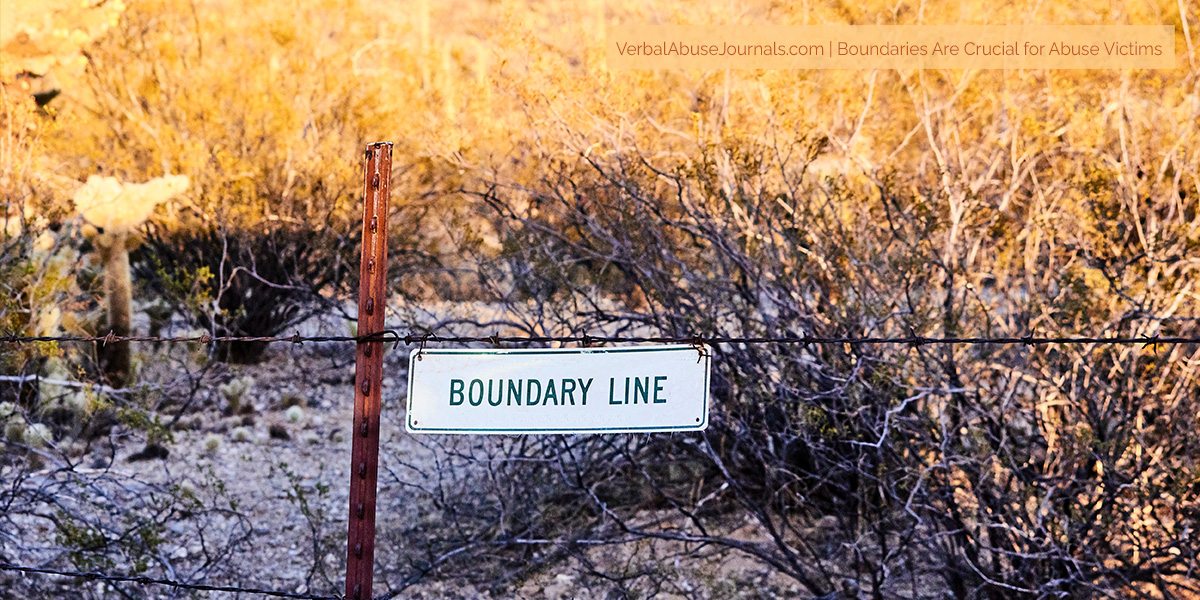My counselors didn’t explain how important personal boundaries were very well, but when my DSS counselor and therapist mentioned personal boundaries in the same week, I went on a research rampage. Setting personal boundaries is the most important thing an abuse victim can do. They enable you to stand up for yourself in a healthy, practical way.
What are Personal Boundaries?
A personal boundary is a rule that YOU SAY cannot be broken without consequence. (What? I can set rules for myself?) Yes indeed. Mentally healthy people have all sorts of personal boundaries (rules) that help insulate them from other people’s negative words and actions.
For example, healthy people make rules for themselves things like:
- “If a person calls me ugly names, I will not hang out with them anymore.”
- “If someone harasses me by phone, I will send their calls straight to voicemail.”
- “If she wastes my time with gossip, I will interrupt her and excuse myself.”
Then, that person follows through with their plan.
Boundaries Help Us Overcome “Victim Mentality”

Yes, I was a victim of verbal, emotional, and mental abuse. Setting personal boundaries for myself helped me realize that I did not have to REMAIN victimized by abuse. I still live with Will, he may attempt to abuse and control me, but I do not have to continue as one of his victims.
I found a terrific web page that helped me set boundaries that made sense to me – a person who had NO boundaries whatsoever. It took a minute to overcome the anxiety of doing something new, but once I got started I really enjoyed the process.
What Happens After You Set A Personal Boundary?
The most important result is that you can now recognize abuse when it happens to you. After writing out even one boundary, you will experience the “red flags” popping up all around you when your abuser steps over your line. The red flags alert you to follow through with your plan – what you said you would do to protect yourself. You will feel stronger and your abuser’s influence over you will diminish.
One of the debilitating side-effects of domestic abuse is the loss of your ability to make decisions. Your abuser works hard to make you feel incapable of making choices – they berate you no matter what you choose to do. When you set and enforce a personal boundary, you are choosing to take action right for you. Your personal boundaries are “decisions” about what you will and will not tolerate. Enforcing your boundaries encourages decision-making and follow-through!
Do I Tell My Abuser They’ve Crossed My Personal Boundary Or Just Act On It?
Once you have set a personal boundary, you do not have to tell the person who crosses your line WHY you’re doing what you’re doing, or even how their behavior makes you feel. You just follow your rule. If your rule doesn’t work for some reason, then you could revise it for the next time.
Of course, maybe it’s in your best interests to tell the person what they’re doing, how it makes you feel, and what you’re going to do for yourself to counteract that feeling. Maybe you feel you need to offer an explanation because the person breaking through your personal boundary is your child or someone else who is very important to you.
In a healthy relationship, it is often critical that you explain what you’re feeling and doing if you want to support your connection. In my case, where I am trying to effect a change on my abuser, I chose to tell him exactly what I was doing and why I was doing it. My personal boundaries helped me feel stronger and more confident.
However, my abuser did not respect nor respond to my boundaries as a healthy man would. He tried to entice me into breaking my rules to prove he won over me. It was extremely difficult to ignore his bellows, insults, and (sometimes) tears. Don’t beat yourself up if you succumb to your abuser’s tricks. Over time you will become stronger and your boundaries will become stronger too.
See Also:
Similar Pages
- First Steps For Abuse Victims
- Reach Out for Help with Domestic Abuse
- Safety Planning for Domestic Violence and Abuse Victims
- Boundaries Are Crucial for Abuse Victims
- Verbal Self-Defense: What You Must Know
- Help a Domestic Abuse Victim Leave the Abusive Partner
- Books About Domestic Abuse
- Verbal Abuse Books That Teach the Vocabulary of Abuse
Featured photo by Erin Larson

